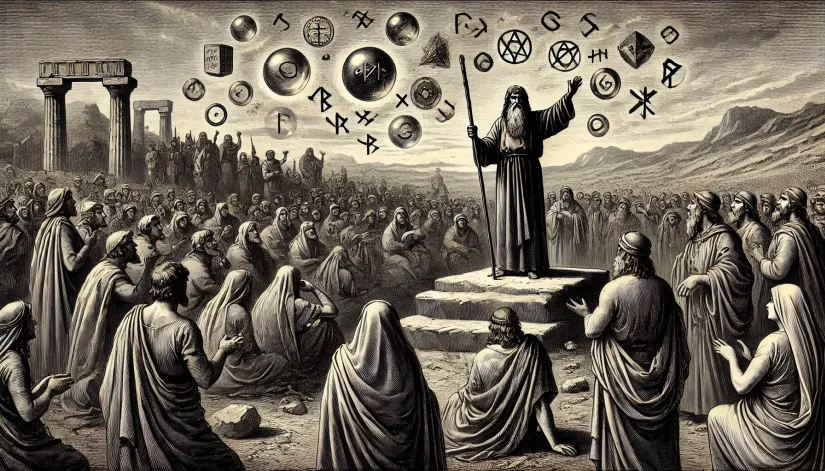At SpookySight, we’ve been getting a lot of questions from readers asking, “What does the Bible say about fortune tellers?” It’s an interesting topic, we give you that.
So, with so much interest in this subject, we decided to do a little bit of digging into the Scriptures and explain the Bible’s perspective and the spiritual consequences of fortune-telling.
This way, those interested in the matter can better understand whether fortune-telling aligns with their faith. But keep in mind, this is just the Bible’s view.
In this article:

What is Fortune Telling?
First things first. What is fortune telling?
Fortune telling is a divination practice that has been around for centuries. It’s commonly used by fortune tellers to predict future events. Or gain insight into a person’s life through supernatural means.
Fortune tellers can use many ways to do that. From card readings, palmistry (reading palms), and astrology to crystal gazing. All are viable “options.”
What do fortune tellers hope to achieve by doing this? They claim these practices can tap into hidden knowledge, spiritual forces, or paranormal abilities to forecast events or provide guidance.
What Does the Bible Say About Fortune Tellers?
In the Bible, this is strongly condemned. According to Scripture, turning to these forms of guidance instead of God is not just discouraged—it’s a sin.
The religious texts are quite clear about this. For example, in Deuteronomy 18:10-12 (NIV), it says:
“Let no one be found among you who sacrifices their son or daughter in the fire, who practices divination or sorcery, interprets omens, engages in witchcraft, or casts spells, or who is a medium or spiritist or who consults the dead. Anyone who does these things is detestable to the Lord.”
This verse sets the foundation for the Bible’s stance about fortune tellers. How so? Because it’s not seen as a harmless curiosity. It’s categorized alongside witchcraft and idol worship.

The Old Testament Warns About Fortune Telling
The Old Testament is perhaps the most harsh and restrictive of all the Bible’s chapters when it comes to what not to do. It’s even harder on divination practices.
According to these texts, from the beginning, God wanted His people to stay away from practices like divination and sorcery. These acts were associated with pagan religions. And typically seen as a direct challenge to God’s authority.
In Leviticus 19:26 (NIV), God commands:
“You shall not eat anything with the blood, nor shall you practice divination or soothsaying.”
The rejection of fortune-telling is a consistent theme throughout the Old Testament. One of the strongest examples comes from Deuteronomy 18:10-12 (NIV), which we mentioned earlier.
But there’s more. In 1 Samuel 28:7-19, we found the story of King Saul who consulted a medium. Despite God’s clear instructions, Saul became desperate and turned to a medium to summon the spirit of the prophet Samuel.
This act was a clear violation of God’s laws. So, Saul faced severe consequences for it. Shortly after, his reign crumbled, and he lost God’s favor.
What does this story imply? That fortune-telling and turning to other spiritual sources can be forms of rebellion against God. It’s not just about disobeying a command. It’s about breaking trust with God.
As 1 Samuel 15:23 (NIV) says:
“For rebellion is like the sin of divination, and arrogance like the evil of idolatry. Because you have rejected the word of the Lord, he has rejected you as king.”
New Testament Examples and Warnings
While the Old Testament lays the foundation for rejecting fortune-telling, the New Testament continues this message.
We found an interesting fragment in Acts 16:16-18, where Paul encounters a slave girl who has a spirit that enables her to tell the future:
“Once when we were going to the place of prayer, we were met by a female slave who had a spirit by which she predicted the future. She earned a great deal of money for her owners by fortune-telling. She followed Paul and the rest of us, shouting, ‘These men are servants of the Most High God, who are telling you the way to be saved.’ She kept this up for many days. Finally Paul became so annoyed that he turned around and said to the spirit, ‘In the name of Jesus Christ I command you to come out of her!’ At that moment the spirit left her.”
It’s an intriguing passage. It shows how fortune-telling was often linked to demonic forces. The girl wasn’t using a “special gift”. She was possessed by an evil spirit that allowed her to see and predict things. When Paul cast out the spirit, her ability to tell the future vanished.
Another essential aspect is how divination practices directly contradict Christian teachings on trusting God. In the New Testament, believers are urged to seek wisdom and guidance through God. Not through fortune-tellers or psychics.
An excellent example of that is James 1:5 (NIV):
“If any of you lacks wisdom, you should ask God, who gives generously to all without finding fault, and it will be given to you.”
So, fortune tellers are not just unnecessary. But they can actually cause spiritual harm.

Why Fortune Telling is Forbidden
At its core, fortune-telling is about gaining control over the future, which, according to the Bible, only God knows.
Here’s another fragment we found in Isaiah 8:19 (NIV):
“When someone tells you to consult mediums and spiritists, who whisper and mutter, should not a people inquire of their God? Why consult the dead on behalf of the living?”
This verse shows the futility and danger of seeking answers from anyone other than God. Fortune tellers (whether they are also mediums, psychics, or clairvoyants) should not try to bypass God’s wisdom (and plan).
James 1:5 (NIV) also reiterates that wisdom should come from God. Not from supernatural or occult sources:
“If any of you lacks wisdom, you should ask God, who gives generously to all without finding fault, and it will be given to you.”
Consequences of Fortune-Telling
So what may happen if you practice fortune-telling (or seek out a fortune teller)? Well, according to the Bible, the consequences can be quite severe. It’s not only displeasing to God but may also cause spiritual issues.
Fortune-telling opens the door to deception. Manipulation by evil spirits. Spiritual judgment. One example we found is in Micah 5:12 (NIV). Here, God promises to cut off all forms of witchcraft and fortune-telling:
“I will destroy your witchcraft, and you will no longer cast spells.”
This verse makes it clear that those who practice or seek fortune tellers face judgment from God.

Christian Alternatives to Fortune Telling
So, what a Christian should do instead? Rather than seeking answers through fortune-tellers, believers are encouraged to rely on God for guidance and wisdom. The Bible offers clear alternatives to these practices.
The first and most important method is through prayer. Prayers are a way to communicate directly with God.
SpookySight recommends:
- The Hierarchy of Angels: The Nine Choirs and the Hidden Order of Celestial Beings
- Who Is Abaddon in the Bible? The Destroyer and the Apocalypse
- 16 Famous Werewolves in Movies and Television
Another alternative is studying the Scriptures. The Bible contains wisdom and clear instructions on how to live a life that honors God. So, by immersing oneself in God’s word, believers can find the answers they need without turning to questionable sources.
Seeking counsel from trusted spiritual leaders (or a faith community) can also provide guidance and clarity.
Finally, you can simply trust God’s plan. Even when the future is uncertain. Fortune-telling may promise quick answers. However, those answers may come from sources that don’t have God’s authority.
Conclusion
What does the Bible say about fortune tellers? You should never seek knowledge or power outside of God. And fortune-telling (as understood in Christian teachings) is viewed as a deviation from trusting in God’s plan and wisdom.
That said, it’s important to remember that the views expressed in this article are rooted in the Bible’s perspective. Other belief systems may have different interpretations.
For instance, some people who follow New Age practices (or certain Eastern philosophies) may see divination or consulting psychics as a way to connect with spiritual forces or gain insight into their lives.
In these contexts, fortune-telling is not necessarily viewed as harmful. Instead, it may be a tool for personal growth or guidance.
Ultimately, it’s up to each of you to decide where you stand on the matter. But for those following the Bible, the message is clear: trust in God alone for guidance.







